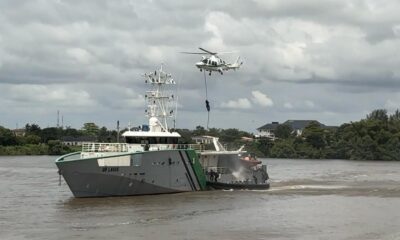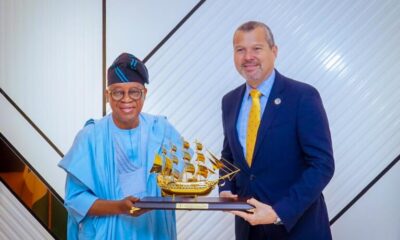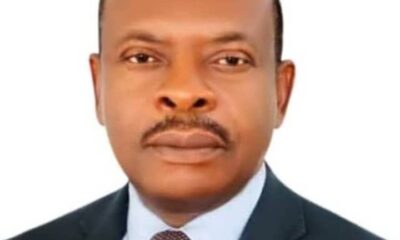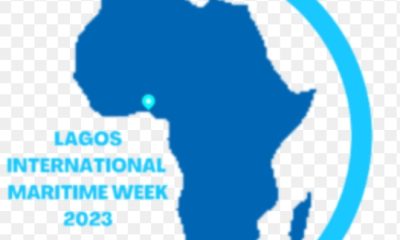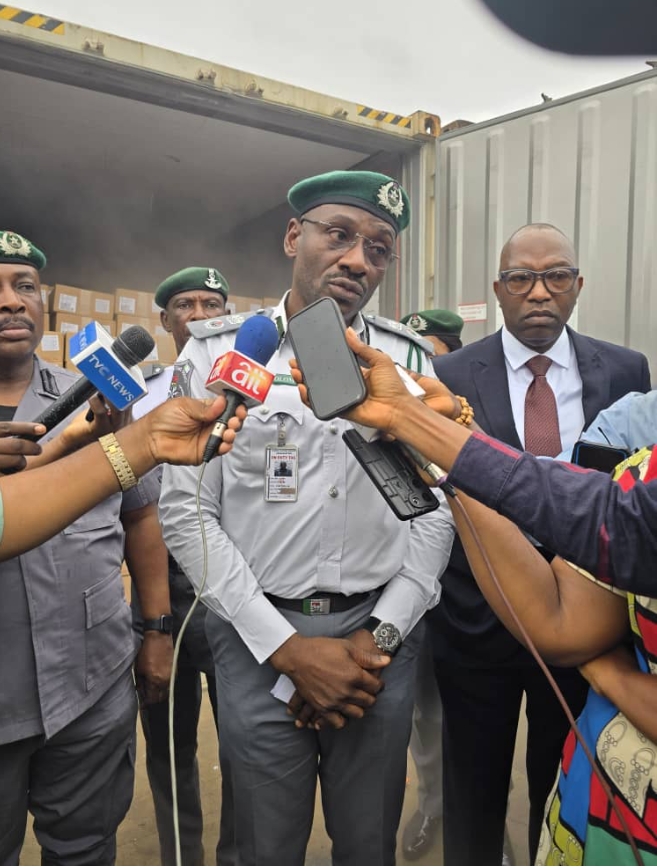Maritime Agencies
PORT STATE CONTROL: Equatorial Guinea Joins Abuja MoU
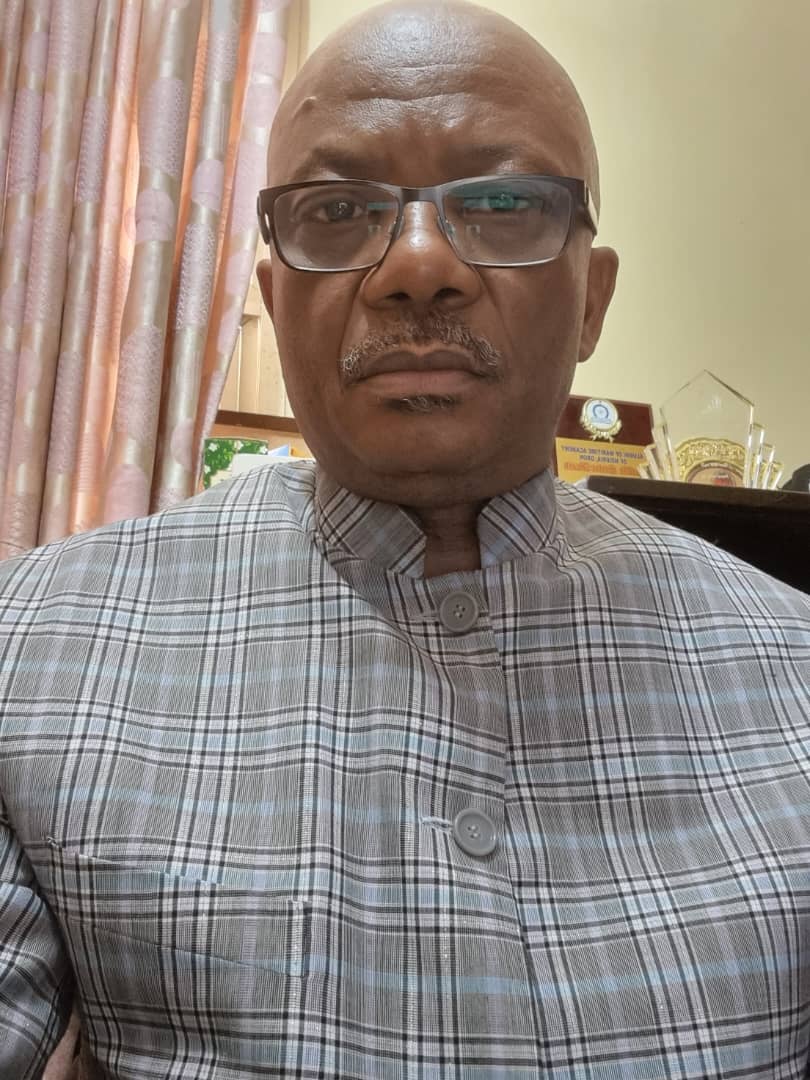
By Izuchukwu Ozoemena
November 23, 2023, Equatorial Guinea finally became a member of the Abuja Memorandum of Understanding on Port State Control in West and Central Africa, otherwise known as the Abuja MoU.
This makes the central African nation the 20th member-state of the group.
Secretary-General of the Abuja MoU, Capt Sunday Umoren disclosed this in Lagos while exchanging views with Falcon Watch Online.
“It means we have two countries in the region left now for all the countries to subscribe as full members. The outstanding countries are the Arab Republic of Mauritania and the Republic of Namibia. These are the countries that are yet to sign up,” the Abuja MoU boss said.
At the occasion, Capt Umoren explained, the Vice President and Minister of Transportation of Equatorial Guinea were present as witnesses.
“Also present were Nigeria’s Ambassador to Equatorial Guinea, the South African Ambassador and the Cameroonian Ambassador to Equatorial Guinea. They were in attendance to celebrate a wonderful day, a great celebration for Equatorial Guinea.”
On the significance of Equatorial Guinea joining the Abuja MoU, Capt who referred to it as a great day said it will be celebrated by the International Maritime Organization (IMO), other MoUs worldwide and the maritime world because with the addition, there is an increase in the number of countries whose ports are now part of the watch dog regarding the propagation and insistence on safety in navigation.
“The port state regime is actually a safety net such that no substandard ships can trade within the regions and around the world”.
“If in a region you have countries that are not full members or not acceding to become full members, it means those countries will not be conducting port state inspection of ships. Substandard ships can easily visit those ports and come out. What does that mean? It means a weak link.”
He stated that substandard ships trading could actually get involved in accidents and spillage and if they are carrying oil, the marine environment will be polluted.
“So, coming into the Abuja MoU means that we are tightening the noose around the region.”
He was optimistic that by the time the remaining two countries join, it means all countries in the West and Central African region have agreed and signed to monitor their waters and their countries to ensure that no substandard vessels are sailing within the system.
“So, everyone will be happy because the probability of substandard vessels slipping through will almost be nill. This means safer seas, safer world for all.”
He said his organization is still engaging the few countries left in the region.
“We are engaging them. We’re quite hopeful that by next year, we will have all the countries in the region subscribe and acceed to full membership of Abuja MoU.”
Port State Control is the inspection carried out on visiting foreign ships to verify their compliance with international instruments on safety, pollution prevention and seafarers’ working and living conditions. It is a means of enforcing compliance in cases where the owner and flag state have failed in their responsibility to implement or ensure compliance.
The Port State can require deficiencies to be put right and detain the ship for this purpose if necessary. It is therefore also a Port State’s defense against visiting substandard ships.
The Secretariat is established to develop a system of harmonized Port State Control Inspection Procedures for the region with the aim of eliminating substandard ships. In pursuit of a strategic direction and with consistent alignment with the context of the organization through a risk-based approach, the Abuja MoU Secretariat is committed to continuous improvement of its quality management system in line with the International Organization for Standardization requirements (ISO 9001:2015) and the IMO Resolution A.686 (17), 1991.
The Memorandum of Understanding on Port State Control for West and Central African Region, generally referred to as the Abuja MoU, is one of the nine regional MoUs established pursuant to the International Maritime Organization (IMO) Resolution A. 682 (17) of 1991. The Organization operates under a cooperative agreement with the IMO.
The Abuja MoU was established in Abuja, Nigeria, on October 22, 1999 as an inter-governmental organization comprising the Maritime Administrations of countries abutting the South Atlantic coast of Africa.
The regime covers 22 countries from Mauritania to South Africa.16 of these countries signed the MoU to establish the organization.
Countries that have completed the procedures and have become full members are Angola, Benin, Cameroon, Cape Verde, Congo Brazil, Cote D’Ivoire and Democratic Republic of Congo. Others are Gabon, The Gambia, Ghana, Guinea Bissau, Guinea- Conakry, Liberia and Nigeria.
Others are Sao Tome & Principe, Senegal, Sierra Leone, South Africa and Togo.
Customs
Ogun 1 Customs Hosts FAED 2026, Highlights Gains of Cross-Border Cooperation, Economic Empowerment and Entrepreneurial Development.
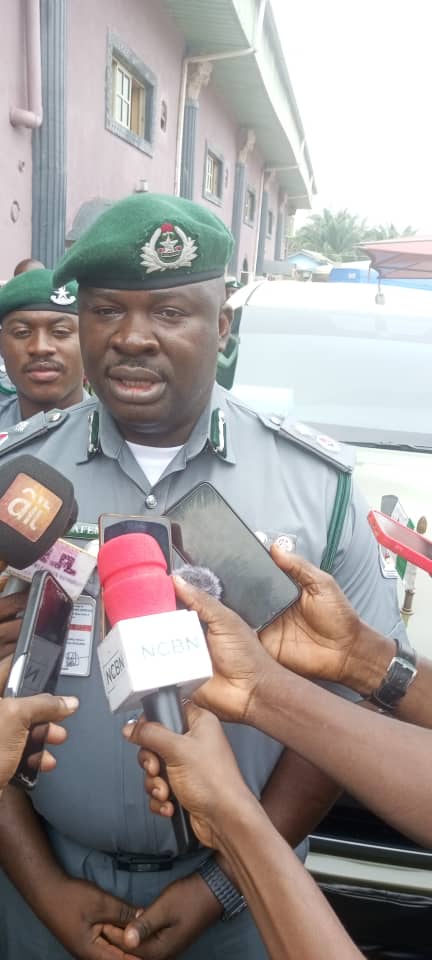
By Izuchukwu Ozoemena
The Acting Customs Area Controller (CAC), Ogun Area 1 Command of the Nigeria Customs Service, Deputy Comptroller O.O.Afeni says the Festival of Arts For Economic Development (FAED) continues to reflect a shared understanding that sustainable border management goes beyond enforcement to encompass cross-border cooperation, economic empowerment and entrepreneurship development within the border communities.
Deputy Comptroller Afeni spoke at the Idiroko Border, Thursday, while declaring open the international colloquium to mark the 5th edition of the Festival of Art for Economic Development to which the Nigeria Customs Service is a strategic partner.
He said: “The theme, ‘Rebranding Borderline Communities through Creative Empowerment and Entrepreneurship,’ aligns with the Nigeria Customs Service’s commitment to supporting legitimate trade, encouraging value addition, and promoting small-scale enterprises as drivers of economic growth and border stability.
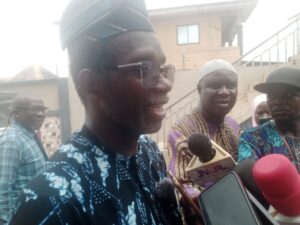
Dr Bonny Abisogun Botoku, Executive Producer, FAED.
He acknowledged the important role of the Nigeria–Benin Inter-Border Forum, under the leadership of its Permanent Secretary, Dr. Bonny Abisogun Botoku in advancing preventive diplomacy, structured dialogue and operational cooperation between Nigeria and the Republic of Benin.
”Through the empowerment programmes and entrepreneurship initiatives embedded in this Festival, we see practical pathways to reducing illicit activities, strengthening lawful commerce, and fostering inclusive economic opportunities for our people.”

Deborah Chiamaka Nwangene, one of the graduating trainees.
”The Nigeria Customs Service remains committed to partnerships that promote peaceful borders, resilient economies and sustainable regional integration.”
During a brief press chat, Comptroller Afeni spoke about enforcing government fiscal policies, saying that this must not be by force.
”The citizens must be made to know the reasons we are here. This is a way of showing the communities that we care about them. You can see that we have trained some people in the art of garri- making painting tye and dye (adire), etc. It’s a way of empowering the community.”
On suggestions that the seminar is capable of deepening cordial relationship between Benin and Nigeria, the CAC could not agree less.
”It is the fifth edition. It has been a situation we see the succeeding version getting better than the previous one. Today, I signed many certificates of people graduating. We’re not just training them; we’re empowering them so that we take them off the smuggling realm and make them better citizens.”
In his presentation, the Executive Producer of the Festival, Dr Bonny Abisogun Botoku described it as more than an event.
”It is a movement. It is a statement of belief—that border communities are not problems to be managed, but potentials to be unlocked.”
He recalled that for too long, border communities across Africa have been spoken about only in the language of risks exemplified in smuggling, insecurity, informality and marginalization.
”But those of us who live and work at the borders know a deeper truth. Borders are not just lines on maps. They are meeting points of culture, gateways of trade,
and spaces of shared history.
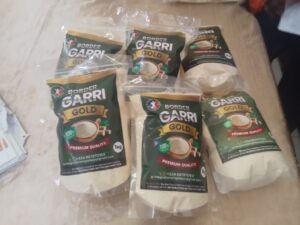
Sample of garri processed and packaged by a trainee.
”The Nigeria–Benin border is not a dividing line—it is a shared civilization. What we are doing through this Festival is to change the story from suspicion to trust, from survival to enterprise,
from isolation to integration.
Contrary to the widely-held belief that culture only concerns entertainment, he explained, culture is power, identity and economic capital.
”Through art, music, fashion, crafts, food systems, and storytelling, communities rediscover pride, cohesion, and voice.
Culture becomes a language of peace, dialogue, and diplomacy—especially in border spaces where differences must be managed with wisdom.
”This Festival deliberately places culture at the center of development, not at the margins.”
Distinguished guests at the event included the Onitaege of Itaege, HRM Oba Matthew Ademola Abisoye and other respected traditional rulers, government officials and representatives of security agencies. Others were partners from the Republic of Benin, artists, cultural practitioners and trainees.
Maritime Agencies
We’re Ever Proactive In Intercepting Prohibited, Falsely Declared Goods, says Controller Onyeka.
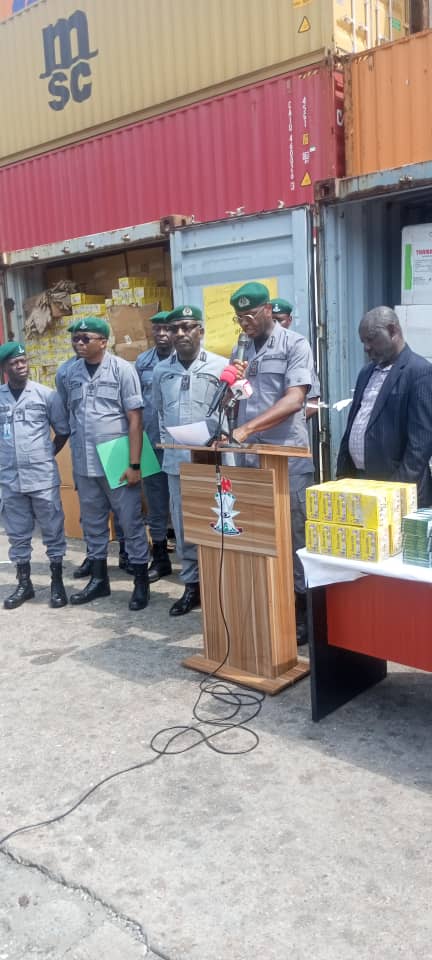
By Izuchukwu Ozoemena
In line with the core mandate of the Nigeria Customs Service, the Tincan Island Port Command is ever proactive in intercepting prohibited and falsely declared goods even as it remains committed to facilitate legitimate trade while contributing significantly to revenue generation.
The falsely declared goods include controlled pharmaceuticals, arms and ammunition, narcotics and other items capable of undermining public safety, security and stability.
The Customs Area Controller (CAC), Comptroller Frank Onyeka stated this in Lagos, Friday, while formally handing over three (3) units of 20 ft containers containing expired pharmaceutical products to the National Food and Drug Administration and Control (NAFDAC) for appropriate regulatory action.
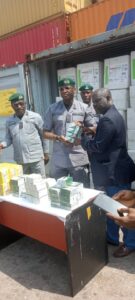
”The containers include two units with numbers PONU031958/6 and MSKU 711656/0 which were found to contain expired Tramadol tablets,” Onyeka announced.
”These consignments were thoroughly examined and the result revealed that the first container contained 86 cartons of Vingil Tramadol BP 50 mg while the second container held 250 cartons of the same expired Tramadol product”.
”The third container with number MSKU413519/1 was found to contain 370 cartons of expired Declofenac Sodium BP 50 mg tablets without a valid NAFDAC registration number, making the consignment illegal and dangerous for public use.”
Beyond these seizures, he explained, the Tincan Command has continued to record notable achievements in recent times through intensified cargo examination, improved intelligence gathering and sustained enforcement operations. These achievements are the result of deliberate strategies anchored on discipline, integrity and strong inter -agency collaboration.
He showed special appreciation to the operatives of NAFDAC for their consistent cooperation.
”Our synergy has continued to yield positive results particularly in ensuring that fake, substandard and expired drugs are intercepted before reaching the Nigerian populace.”
He equally commended officers and men of the Command for being resilient and committed to duty, a development that has continued to strengthen the credibility and operational effectiveness of the Command.
”Furthermore, I express our sincere appreciation to the Comptroller-General of Customs, Bashir Adewale Adeniyi, PhD, MFR, psc (+) for his purposeful leadership and strategic reforms which have empowered our operations.”
The CAC later handed over the prohibited pharmaceuticals to Mr Kareem Taiwo Adekunle, the Chief Regulatory Officer (Investigation and Inspection Directorate), NAFDAC, Apapa.
Maritime Agencies
Zone ‘A’ Coordinator, Mohammed Babandede, Visits Apapa Command, Commends Officers’ Sterling Performance.
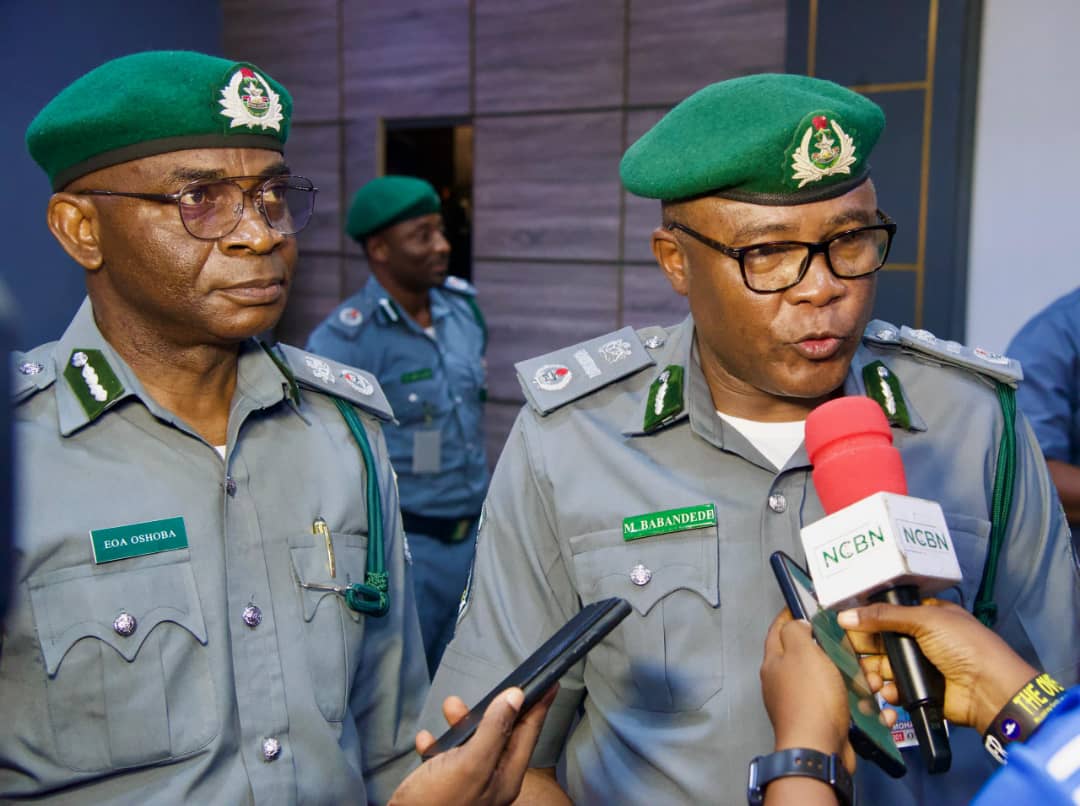
By Izuchukwu Ozoemena
Officers and men of the Apapa Customs Command have received a special commendation for maintaining an exceptional performance in revenue generation, anti-smuggling operations and trade facilitation throughout 2025.
Mohammed Babandede, Assistant Comptroller-General of Customs (ACG) and Zonal Coordinator, Zone ‘A’ of the Nigeria Customs Service handed down the commendation during his familiarization visit to the Command, Thursday.
Chief Superintendent of Customs, Isa Sulaiman, the image maker of the Apapa Customs Command disclosed this in a press release.
Addressing officers and men during the visit, the image maker stated, the Zonal Coordinator explained that the purpose of his coming was to acknowledge the operational challenges faced by the Command, appreciate its notable achievements and further boost the morale of personnel who have consistently surpassed expectations, particularly in revenue collection where the Command exceeded its annual target.
”The ACG also lauded the Command’s sustained anti-smuggling efforts, especially the significant seizures of narcotics and other illicit substances including cocaine and tramadol, describing these interceptions as critical contributions to national security, public health and societal safety. ”
Effective enforcement, the ACG emphasized, remains fundamental to creating a secure environment for legitimate trade to thrive.
While noting that the core responsibilities of the Service extend beyond revenue generation to include national security, public safety and trade facilitation, the Zonal Coordinator commended the Apapa Command for its effective inter-agency collaboration. He urged officers to deepen cooperation with sister agencies, particularly in the deployment and promotion of trade facilitation tools that have positioned the Service at an upper-class operational rating.
The Zonal Coordinator further stressed the importance of integrity, reputational management, mentorship and capacity building within the Command. He urged senior officers to transfer knowledge and experience to younger officers while also drawing attention to the importance of officers’ welfare and health, disclosing that drug tests would be conducted across Commands. He advised officers to remain health-conscious for effective service delivery.
In his remarks, the Customs Area Controller, Apapa Area Command, Comptroller Emmanuel Oshoba, expressed appreciation to the Zonal Coordinator whose February 5 visit was motivating and timely. He reaffirmed the Command’s commitment to sustaining its performance in revenue generation, enforcement, trade facilitation, inter-agency cooperation and ethical conduct in strict adherence to the Nigeria Customs Service Act, 2023 and the policy thrust of the Comptroller-General of Customs, Dr Adewale Adeniyi.
-
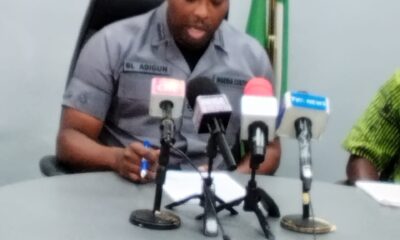
 Customs3 weeks ago
Customs3 weeks agoKLT Customs Surpasses 2025 Revenue Target By a Wide Margin, Clamps Down on Expired Imports.
-

 Customs1 week ago
Customs1 week agoFreight Forwarders Warn FAAN To Halt New Charges In Airport Cargo Operations or Risk Rumble in the Sector .
-

 Maritime Agencies3 weeks ago
Maritime Agencies3 weeks agoOGUN AREA 1 CUSTOMS: Suspected Armed Drug Traffickers Mount Barricades, Attack Officers. Two Personnel Critically Injured.
-
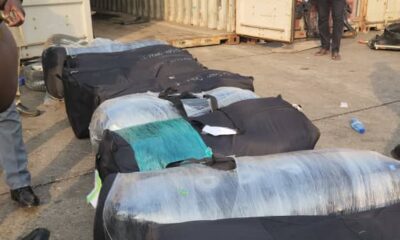
 Maritime Agencies2 weeks ago
Maritime Agencies2 weeks agoWAR AGAINST KILLER DRUGS: Apapa Customs, NDLEA Collaborate To Nab Huge Quantity of ‘Canadian Loud’.
-

 Customs2 weeks ago
Customs2 weeks agoLekki Deepsea Port: The Success Story of the Nigerian Ports Authority.
-
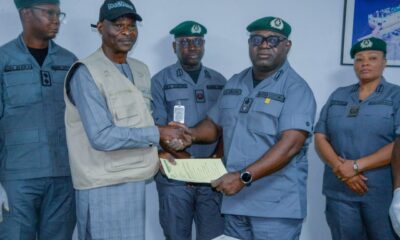
 Customs2 weeks ago
Customs2 weeks agoPTML Customs Hands Over Seized Arms and Ammunition, Collects N44.06bn in January.
-
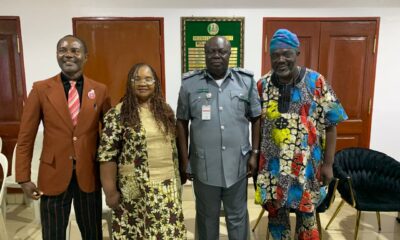
 Maritime Agencies2 weeks ago
Maritime Agencies2 weeks agoSeme Customs Raids Hideouts, Impounds 200 Bags of Smuggled Rice, Collects N2bn 3 Weeks into 2026.
-
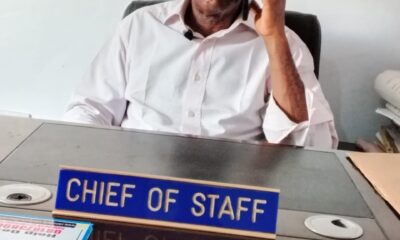
 Maritime Agencies2 weeks ago
Maritime Agencies2 weeks agoNAGAFF Compliance Team Set to Relaunch for Stronger Engagement, Enforcement.


